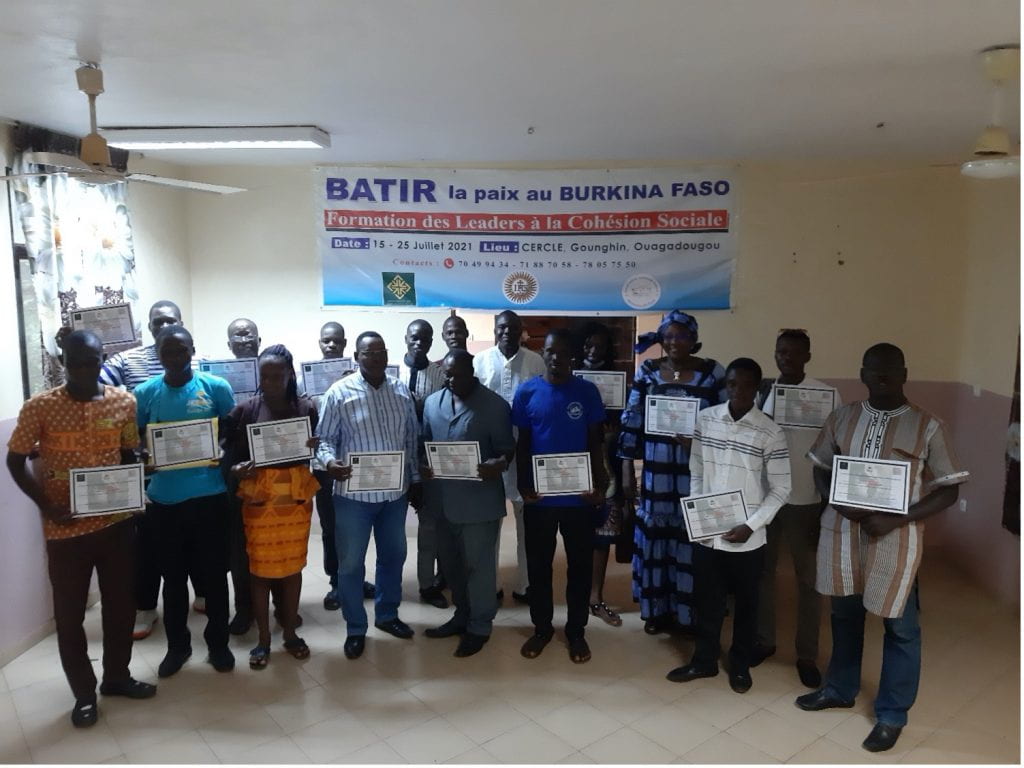
Barwendé Médard Sané, SJ, a Jesuit Priest from Burkina Faso, is the Jesuit Graduate Fellow of the USF Institute for Nonviolence and Social Justice (INSJ). This summer Fr. Sané has launched a major international project on behalf of INSJ. He has completed the first part of the project: conducting intensive nonviolence training workshops Ouagadougou Burkina Faso for community leaders from throughout the country. The second part of the project will involve conducting similar workshops for community leaders in the neighboring country Benin. Fr. Sané’s initiative has great urgency at this time: civilian communities in both countries have been suffering from violence because of armed terrorist groups linked to ISIL (ISIS), al-Qaeda militant jihadist networks that have been active throughout the Sahel region; because of violent conflict related to confrontations with various indigenous and foreign military forces; and because of ethnic, tribal, and religious divisions and related communal animosities that have intensified as a result. Fr. Sané has asked me to share with our entire community the following status report from the field upon completion of the first part of his project. I am honored to do so.
~Jonathan D. Greenberg
Nonviolence Training for More than One Hundred African Leaders, a Letter from Ouagadougou, Burkina Faso
From July 15th to July 25th, the CPA project (“Contributing to Peace in Africa through Nonviolence Training and Capacity Building of Community and Religious Leaders”, or “CPA project”), I launched in Ouagadougou, Burkina Faso, was deployed in three different workshops. Over one hundred leaders were equipped with lessons in nonviolence, conflict transformation, and peace-making in Ouagadougou, Burkina Faso. The training was based on the manual, Manuel d’Education a la Paix en Afrique.
The first group of leaders was made up of seventy-two female leaders. The choice of these leaders was strategic, since women in Burkina Faso are very dynamic and are engaged in various fields of community issues. Their impact in society is impressive. Most of these community leaders are committed to promote the rights of women and children, develop programs related to the protection of the environment, the processing of forest products, the care of orphans and widows. In three days, they learned how to use the manual and benefited from two modules developed on conflict management in families and non-violent communication. All of them committed to use the manual adequately to sensitize members of their associations and contribute to enhance their community efforts to build peace. In addition, they pledged to contribute in defusing conflicts in their neighborhood. Some of them were pleased to share their projects to come: “I promise to use the manual to turn my association into a peace talk club. I also intend to go to the villages to reach out to the traditional chiefs” said Mariam, a participant. “The issues raised in the manual concern our country and we must work to spread the lessons developed during the workshop” said Binta, another beneficiary of the program.
The second group of leaders was made up of fifteen young people from two very influential civil society organizations, namely the MBDHP (Burkinabe Movement for Human and People’s Rights) and the MPAP (Movement for the Culture of Peace and Love for the Fatherland). These nongovernmental social movements are engaged in activism related to the issues of human rights. During the training developed for these leaders, the discussions were focused on the challenges of human rights in Burkina Faso and the process of dialogue to initiate with armed groups.
The third group of leaders, was also made up of fifteen members who benefited from the training. They were representatives of the Association of Islamic and Christian dialogue, governmental representatives from the ministries of Reconciliation and National Education. In this workshop the leaders were more concerned with the modules related to living together, inter-community cohesion and especially problems related to reconciliation and interreligious dialogue.
At the end of every workshop, certificates of participation were given to the different participants to attest their commitment. In addition, every participant filled a form in which he/she expressed their commitment to work for peace. All the recipients were very unanimous in expressing their gratitude to the USF Institute of Nonviolence and Social Justice, for contributing to reinforce their peace building capacities. In addition, copies of the manual have been sent to peace-making leaders who are in the Central African Republic and Mali. Very soon, some copies will be sent to Niger and Benin. The leaders will use them to train their communities. The next steps of the CPA project will consist in media broadcasting on the topic of peace and reconciliation. After Burkina Faso, Benin will benefit from the program.
Barwendé Médard Sané, SJ.
